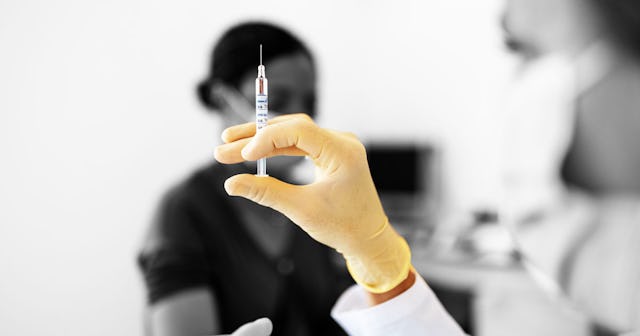The Second Dose Of The COVID Vaccine Might Kick Your Butt

After a year of avoiding crowds, social events, and air travel, a year of schooling from home, of socially distanced birthday “parties” and holidays, I’m finally starting to feel something like hope. Friends have been posting about their COVID-19 vaccinations, proudly showing their certificates and stickers and little pink spots on their arms. Vaccine production is scaling up, with states receiving about 13.5 million vaccine doses per week.
Polls indicate that more Americans are willing to get the COVID-19 vaccine.
As more and more people are vaccinated without major side effects, confidence grows that the vaccines are as safe as scientists told us they would be. Of course, plenty of people are still wary. Some are anti-vaccine altogether and determined to cling to their distrust of scientists and ignorance about the benefits of vaccines in general. Others are nervous about the COVID-19 vaccine in particular. They fear it was developed too quickly, that we don’t know enough about it. And some folks see an intense second-dose reaction a friend posted on Facebook and allow fear to set in.
At this point, it’s well-documented that the second dose typically elicits a stronger reaction than the first. Many people have little to no reaction with the first dose, but experience side-effects such as fever, chills, tiredness, and headache with the second. This is in line with what the CDC tells us, and it tracks with the results of clinical trials for both Moderna and Pfizer/BioNtech.
Why is the second dose of the COVID-19 vaccine more likely to provoke a stronger reaction?
It’s because the second dose builds on the first dose. The body’s response to the second dose is, metaphorically, as if your immune system was like an electric fence designed to keep out zombie invaders. With the first round, it charges up just enough to keep out a first wave of attacking zombies, stopping the charge once successful. When it detects the unexpected presence of yet more zombies (the second dose), it gets serious and ramps up the charge even more than the first time.
With the first dose, our body’s immune system thinks it’s done enough to protect us. When it gets that second onslaught a month later, it’s like, “Beg your pardon? You’re here again? NOT TODAY” — and reacts accordingly. For some people, this secondary immune reaction can present as those flu-like symptoms mentioned before. It’s a good thing that your body is reacting. Uncomfortable? Sure. But this is your body doing its job.
Well then, if I don’t have side effects, does that mean the vaccine isn’t working?
National Cancer Institute/Unsplash
Nope. In fact, many people have very few side effects to either vaccine, including with the second dose. In the Moderna and Pfizer trials, about 50% of participants experienced no side effects at all and yet still had the same 94% rate of protection. According to the trials and ongoing CDC tracking, whether or not you have side effects, or how strong your side effects are, have no bearing whatsoever on how well you’re protected. Bodies just react differently as they build immunity.
How do I know if my side effects are bad enough that I should see a doctor?
If you have a history of allergic reactions, you should wait at your vaccine site for 30 minutes after your shot for observation so that in the unlikely event you need medical intervention, it’s available. Again, this is an extremely unlikely occurrence, so unlikely that it doesn’t even make it on the data map for COVID-19 vaccine reaction tracking. Local allergic reactions such as redness and swelling at the injection site are totally expected and normal and will subside after a couple of days.
How to prepare for the second dose of your COVID-19 vaccine
It is best to assume you will have at least some side effects when you get your second dose. If you had side effects with the first dose, expect them to be more intense with your second dose. If at all possible, plan to take a day or two off after getting your vaccine, as aches and fever can definitely interfere with your ability to maintain your daily routine. Talk to your doctor about the best pain relief or fever reducer for you. They will likely recommend an over-the-counter pain reliever, or for a light allergic reaction they may recommend an antihistamine.
Regardless, take comfort in the fact that now that millions of people have received first and second doses, we are gathering more and more data that shows it is incredibly safe to get a COVID-19 vaccine. As one friend of mine whose injection site became red and swollen and itchy with her second shot said on Facebook, “I promise this is better than not being able to breathe.”
Information about COVID-19 is rapidly changing, and Scary Mommy is committed to providing the most recent data in our coverage. With news being updated so frequently, some of the information in this story may have changed after publication. For this reason, we are encouraging readers to use online resources from local public health departments, the Centers for Disease Control, and the World Health Organization to remain as informed as possible.
This article was originally published on